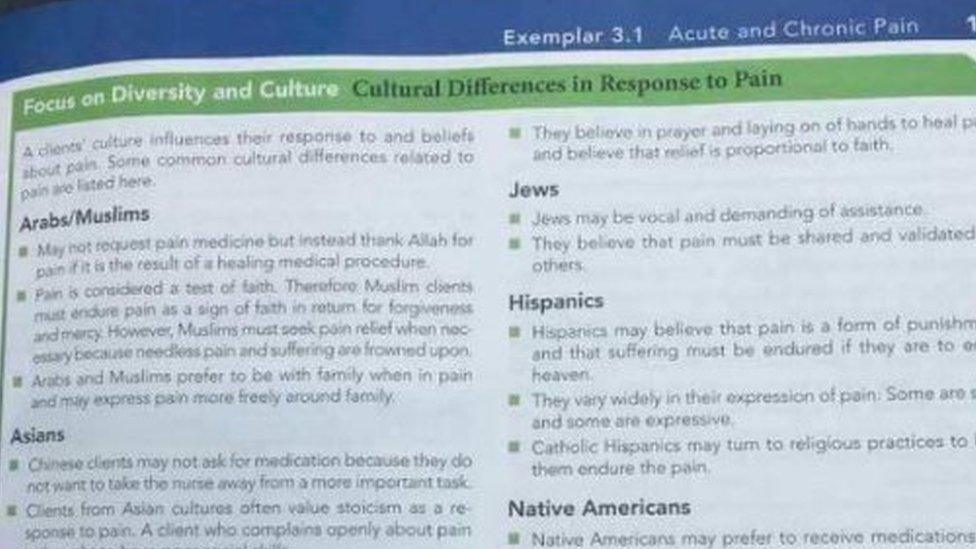Publisher apologises for 'racist' text in medical book
- Published

The publishers of a textbook for nurses that has been criticised by social media users for containing racist material, have apologised for the offence caused and removed the offending passages.
Nursing: A Concept-Based Approach to Learning, contains advice for nurses when administering pain relief to people from different ethnic backgrounds.
It begins: "A client's culture influences their response to, and beliefs about pain. Some cultural common differences related to pain are listed here."
The page contains headings for different communities. Here are some of the excerpts:
Arabs/Muslims
May not request pain medicine but instead thank Allah for pain if it is the result of the healing medical process.
Pain is considered a test of faith. Muslim clients must endure pain as a sign of faith in return for forgiveness and mercy.
Asians
Chinese clients may not ask for medication because they do not want to take the nurse away from a more important task.
Indians who follow Hindu practices believe that pain must be endured in preparation for a better life in the next cycle.
Blacks
Blacks often report higher pain intensity than other cultures.
They believe suffering and pain are inevitable.
Jews
Jews may be vocal and demand assistance.
They believe pain must be shared and validated by others.
Hispanics
Hispanics may believe that pain is a form of punishment and that suffering must be endured if they are to enter heaven.
They vary in their expression of pain. Some are stoic and some are expressive.
Native Americans
Native Americans may prefer to receive medications that have been blessed by a tribal shaman.
They may pick a sacred number when asked to rate pain on a numerical pain scale.
The image of the page was shared on Facebook on Monday by Onyx Moore, external in California. She posted: "This is an excellent example of how not to be even remotely culturally sensitive.
"These assumptions are not evidence based, they encourage nurses to ignore what the patient is actually saying.
"If someone tells you their pain level is high you need to believe them."
Her post has been widely shared on both Facebook and Twitter attracting thousands of comments from users, most of whom expressed outrage at what they perceived as racist stereotyping.
One Facebook user posted:, external "I'm so disgusted. In 2017 how is this being published?"
Another user commented:, external "How old is this book? Like... 200 years old?"
But another Facebook user suggested:, external "I know this looks awful, but I don't think it's as much about thinking other cultures don't experience pain. It's about how they express/interpret their pain."
You may also like:
By the middle of the week, Ms Moore's Facebook post was gaining traction across other social media platforms. Lyndsay Morgan in California tweeted the post, external. She told the BBC: "Seeing the page in a textbook like this is shocking for me as a Jewish disabled woman.
"When I'm in hospital I want a nurse to see me for what I am - someone who needs medical attention not as a Jew that needs attention and validation."
The social reaction to the post prompted an apology by the textbook's publisher Pearson.
Allow X content?
This article contains content provided by X. We ask for your permission before anything is loaded, as they may be using cookies and other technologies. You may want to read X’s cookie policy, external and privacy policy, external before accepting. To view this content choose ‘accept and continue’.
Further apologies were issued on Pearson's Twitter page as the criticisms on social media increased amid fresh accusations, external that the excerpts were not limited to one textbook but featured in at least one other.
Allow X content?
This article contains content provided by X. We ask for your permission before anything is loaded, as they may be using cookies and other technologies. You may want to read X’s cookie policy, external and privacy policy, external before accepting. To view this content choose ‘accept and continue’.
One Twitter user, external compared the content to Nazi propaganda: "It legit short-circuited my brain for a minute when I read it. I'm used to seeing that in eugenics-era books."
On Friday Pearson uploaded a two-minute video, external on its YouTube channel of Tim Bozik the president of the company's global development addressing the complaints.

Tim Bozik: "It was wrong. We should have been more thoughtful about the information we put in our curriculum."
In a statement to the BBC the publisher said: "While differences in cultural attitudes towards pain are an important topic in medical programs, we presented this information in an inappropriate manner.
"We apologise for the offense this has caused and we have removed the material in question from current versions of the book, electronic versions of the book and future editions of this.
"In addition, we now are actively reviewing all of our nursing curriculum products to identify and remove any remaining instances of this inappropriate content that might appear in other titles."
- Published22 September 2017

- Published18 October 2017
